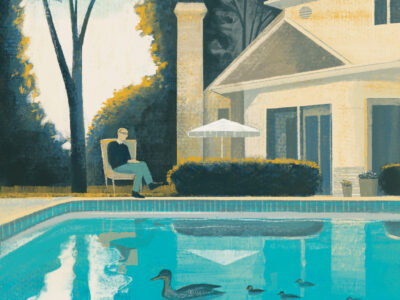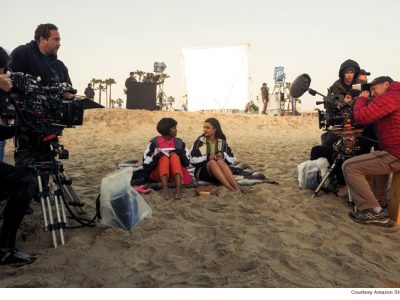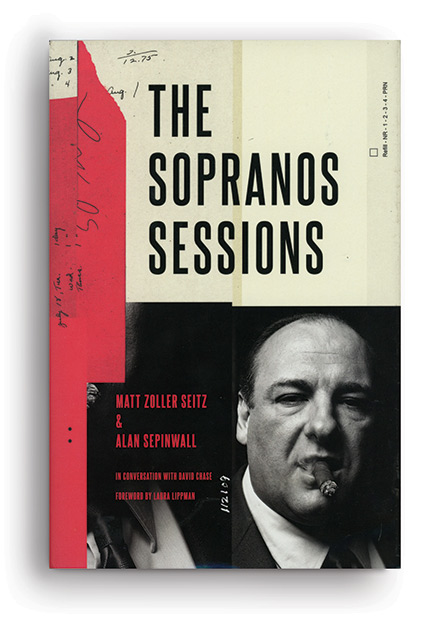MEDIA SUMMIT 2005 | Introducing Penn’s 2005 Media Summit on “The Road to Reality Television,” Jean Chatzky C’86, financial editor for NBC’s The Today Showand editor-at-large for Money magazine, admitted that she wasn’t sure why she’d been chosen to kick off the panel.
“I have no real connection to reality TV,” she admitted, “except that I watch it, and I’m endlessly fascinated by it, from Survivor to American Idolto The Biggest Loser.”
Why is Chatzky, along with so many of us, still hooked? The audience, who braved an unseasonable blizzard to get to the Walter Reade Theatre the evening of March 8, was rewarded with some expert opinions on the realities of reality television.
The Contender, one of the most hyped reality-TV shows, happened to premiere on the eve of the summit. According to the Nielsens, the boxing show debuted to an underwhelming audience, lagging behind nine other shows. Was this a death knell for reality television? Nowhere near it, according to the four panelists. The Contender simply never had what it took to approach the ring.
“It’s women who’re watching reality TV, and The Contenderhas too much blood, guts, and fighting, and not enough story,” said Mark Apfel C’96, head of development at True Entertainment, which currently has 13 reality shows, including Town Haul and Gastineau Girls, in production. Maury Povich C’62, host of his own eponymous daytime talk show, added, “I don’t care who you are, you have to have women in the middle of conflict on primetime TV.”
But can a show still be billed as “reality” if people behind the scenes are manufacturing conflict and influencing the storyline?
“There’s so much tape—hours and hours of stuff that is just not interesting,” said Pamela Berstler C’84, founder of Flower to the People, Inc., an exterior-design business and television production company that created Rally Round the House for the Discovery Channel. “The challenge is, how do you make it interesting?” Our day-to-day lives, the panelists agreed, are plenty boring. They’ve spent hours in the editing room, sifting through the evidence. Reality hasto be produced.
“There used to be no directors in reality TV,” said Apfel. “Now there are, and there are writers who create situations. They map out story arcs for the season. We devise tricks and hope the characters will react how we want them to.”
Our ultimate reality TV—the news—may be one of the most manipulated forms of media. “Most of the news in the United States is pablum, soundbites that are directed and produced,” said Christopher Ahearn W’89, president of Reuters Media.
Moderator Bill Boggs C’62 ASC’64, a longtime television interviewer and producer, asked the four panelists to weigh in on what makes a reality show successful: Anna Nicoleand the Osbournes (“The characters are on the border between in it and out of it—that’s fascinating to watch.”); The Swan (“You’re seeing people in real pain.”); Jackass(“It’s funny. It’s like watching Tom and Jerry.”). Then there are the not-so-successful attempts, like Who’s Your Daddy?,the defunct Fox show that rewarded a young woman who was placed for adoption at birth for recognizing her biological father among a lineup of eight potential dads. “That bombed because everyone wanted to be the daddy—there was no conflict,” said Povich. “On my show,” he added, “nobody wants to be the father.”
Daytime talk shows, Povich said, are the reality form of soap operas, except that they spend an hour on a theme instead of six months. Like the successful primetime reality shows, daytime talk shows have that gaper-delay appeal: you’ll keep watching to see how far people are willing to go. And no matter the life expectancy of reality TV, there’ll never be a shortage of “real” people to provide the drama. In one Maury episode, a guest revealed that he’d never slept with the woman whose baby’s father’s identity was in question. “He just wanted to be on TV,” said Povich.
What’s next? Dating, makeover, reunion, and elimination shows are old news. Viewers have no interest in used-up formulas. “People don’t care about the third season of TheApprentice,” said Apfel. At the same time, the major networks don’t want to take a chance on anything that’s unproven. So reality TV’s presence will continue to grow on cable, and on the networks the shows will move farther and farther from reality. That includes hiring directors and writers to influence onscreen action and paying celebrities to host or star in upcoming shows. All of these added expenses will increase production costs and undercut reality TV’s original appeal for the industry: its low price tag. “Trump gets a million per episode for The Apprentice,” said Apfel. “That’s a threat to my company. We can’t do that.”
The panelists threw out some more predictions. Povich cited the success of Desperate Housewives as a harbinger of more shows like Dynasty and Dallas. Apfel said game shows and sitcoms might make a comeback, but not anytime soon. Ahearn forecasted further fracturing of the general audience, with multiplying cable channels, and footage being streamed over the Internet. All agreed that there are more job opportunities than ever. The industry is exploding. (“Just be willing to get in at whatever level,” Berstler said.) As far as the actual content of reality TV, “There’s a running bet in my office,” said Apfel, “that there will be pay-per-view executions.”
—Caroline Tiger C’96




